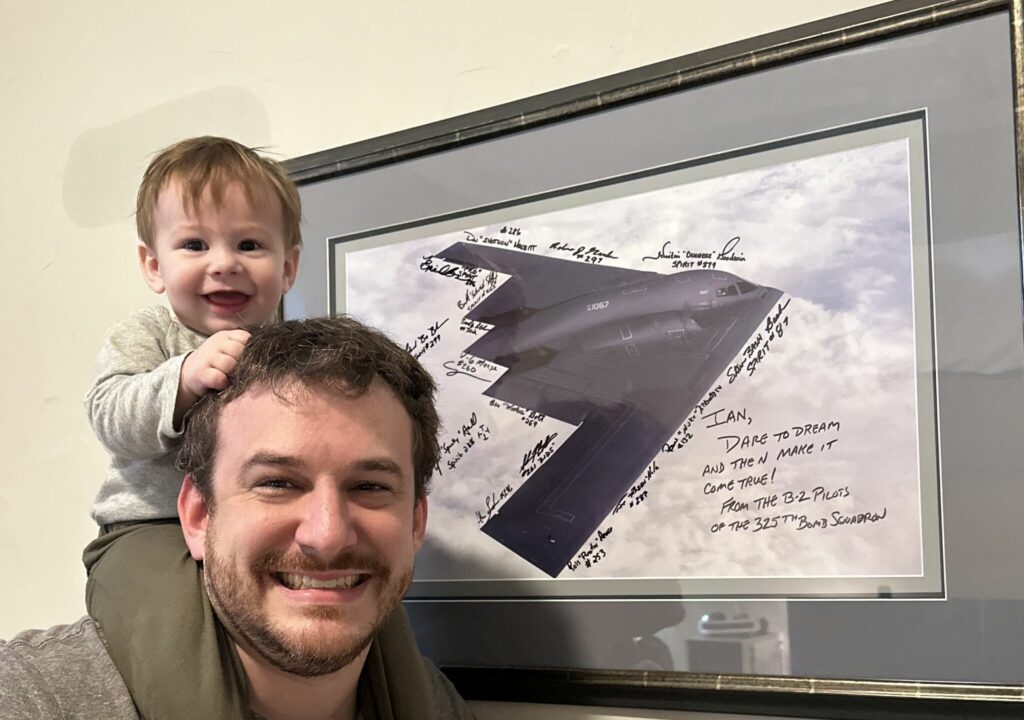Engineers Week: S&T alumni found aircraft startup company
Posted by Greg Edwards

Jake Armenta, a 2014 Missouri S&T graduate, is a founder of Outbound Aerospace. Photo courtesy of Armenta.
The theme for National Engineers Week 2024 is “Welcome to the Future,” and two Missouri S&T alumni say this aligns perfectly with the focus of the large aircraft startup company they founded last year.
“That’s our whole vision,” says Jake Armenta, who graduated from S&T in 2014 with a bachelor’s degree in electrical engineering. “We are working to create the next generation of airliners. Our airplane will have a different design, better materials and use significantly less fuel than the current major airliners. We are the future of the industry, and we welcome people to check out what we are doing.”
For years, Armenta and Ian Lee, who earned a bachelor’s degree in engineering management in 2015, had considered different startup ideas, but they say none of them ever felt right. Finally, in 2023, they decided to go all-in and launch Outbound Aerospace after realizing the positive impact they could make on the world.
“I have been sketching planes ever since I was a kid,” Armenta says. “My major was in electrical engineering, but throughout my career, I have applied my knowledge and passions to the aerospace field. This is what I have always wanted to do, and I’m now ready to get Outbound Aerospace lifted off the ground.”
Since graduating from S&T, Armenta worked for Relativity Space, a rocket manufacturing company that is well-known for its use of 3D-printing for its projects, and Boeing Phantom Works, which handles prototyping related to Boeing’s national defense and security work.
Lee’s career path has primarily been in the medical device industry, but he says many of the skills he developed in that industry, as well as while he was a student at S&T, have prepared him for his current career path.

“I spent my time at S&T and the early part of my career learning how to build a company around innovative engineers and demanding customers,” he says. “Growing up, I aspired to be an astronaut, so building a company in the aerospace industry feels like coming home. I’m excited to finally be a part to this industry.”
Starting this sort of enterprise from the ground up may sound intimidating to some entrepreneurs, but Armenta and Lee already have some similar experiences from their time at S&T.
“We were founding members of the university’s Mars Rover Design Team,” Lee says. “Along with the other founding members, we were given so much latitude and trust to build the team from the ground up, and S&T taught us that we can truly do anything.”
Now, they have their eyes set on the sky, as opposed to the red surface of Mars. They have a design for an aircraft that they named Olympic, which they anticipate can be built more efficiently and with more climate-friendly technology than some of the traditional aircraft companies’ vehicles. The plane will have a blended wing and body design and more of a triangular shape than current aircraft.
Armenta says some examples of Outbound’s other innovations include 3D-printing with a lightweight carbon-fiber structure, more digital modeling and testing as a way to lower expenses, all-electric subsystems and AI-predicative maintenance systems.
Over the next year, the company founders plan to pitch their startup to investors and hope to have enough funding to go through a full design review and develop a scale model for their new aircraft that they can use for validation testing.
About a decade from now, they hope to have fully approved airplanes in the sky with passengers aboard and appreciating their years of work.
“We are confident in our goals and ability to reach them,” Armenta says, “and we are excited to show the world the future of the aircraft industry.”
About Missouri S&T
Missouri University of Science and Technology (Missouri S&T) is a STEM-focused research university of over 7,000 students located in Rolla, Missouri. Part of the four-campus University of Missouri System, Missouri S&T offers over 100 degrees in 40 areas of study and is among the nation’s top public universities for salary impact, according to the Wall Street Journal. For more information about Missouri S&T, visit www.mst.edu.
Leave a Reply